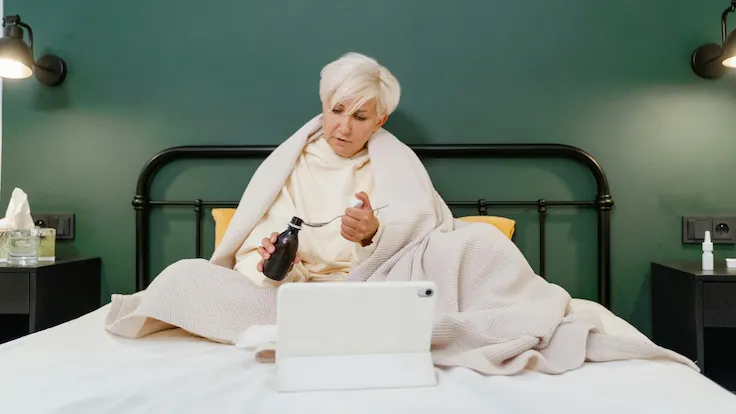Recover from Yeast Infection with Dimer Health once you leave the hospital
A yeast infection is a type of fungal infection that can occur in various parts of the body, commonly caused by an overgrowth of the Candida fungus. Post-acute care after hospitalization is important to prevent complications and ensure a smooth recovery, including monitoring for and treating any potential infections such as yeast infections.
Get a personalized care plan and 24x7 clinical support until you fully recover:
Schedule your video call with one of our experienced providers
We will create a personalized core plan and set follow up appointments as needed
You will have 24x7 support for any question via phone, text or web app
We accept most insurances and currently available in New Jersey and New York
How it works
What is Yeast Infection
A yeast infection, also known as candidiasis, is a fungal infection primarily caused by the yeast species Candida albicans. These yeasts are commonly found in small amounts in the human body, but they can proliferate excessively under certain conditions, leading to infection. The most frequent type of yeast infection occurs in the genital area, causing itching, burning, and discharge. It can affect both men and women, though it's more common in females.
Treatment typically involves antifungal medications, which can be administered orally or as creams, ointments, or suppositories applied directly to the affected area. It's important to complete the full course of treatment to fully eradicate the infection. Additionally, maintaining good hygiene, wearing breathable clothing, and avoiding the use of irritating soaps or bath products can help prevent yeast infections. For recurrent cases, changes in diet and lifestyle may be recommended to help reduce the frequency of outbreaks.
Please call or book an appointment with us if you think you have Yeast infection or are recovering from it
Yeast Infection Recovery Tips
Recovering from yeast infection treatment after a hospital discharge involves managing symptoms and preventing future infections. Here are some essential tips to aid in your recovery:
Following these tips can help you recover more comfortably and effectively from Yeast infection.
- Complete the Treatment: Follow through with the full course of any antifungal medications prescribed, whether they are oral or topical. This helps ensure that the infection is fully eradicated.
- Keep the Area Dry: Yeast thrives in moist environments, so it’s important to keep the affected areas as dry as possible. Pat the area dry gently after bathing and avoid sitting in wet clothing, like swimsuits or sweaty workout gear.
- Wear Loose, Breathable Clothing: Opt for underwear and clothes made from natural fibers like cotton, which allow your skin to breathe and reduce moisture buildup.
- Avoid Irritants: Skip scented hygiene products such as soaps, lotions, and laundry detergents, as they can irritate the affected area and disrupt the natural balance of bacteria and yeast in your body.
- Change Hygiene Products Frequently: If you're experiencing a vaginal yeast infection, change sanitary pads and tampons regularly during your menstrual cycle to maintain cleanliness and dryness.
- Manage Blood Sugar Levels: If you have diabetes, keeping your blood sugar levels in check can help manage and prevent yeast infections, as high sugar levels can promote yeast growth.
- Eat a Balanced Diet: Reducing sugar and refined carbohydrates can help decrease the amount of yeast in your body. Consider incorporating probiotics like yogurt or supplements that can help maintain the natural balance of bacteria in your gut and reduce yeast growth.
- Practice Good Hygiene: Maintaining cleanliness is crucial. Regularly wash and thoroughly dry the affected area to prevent the growth of yeast.
- Avoid Unnecessary Antibiotics: Antibiotics can kill off beneficial bacteria that control yeast growth. Only take antibiotics when prescribed and necessary.
- Follow-Up Care: Attend any follow-up appointments with your healthcare provider to ensure the infection is completely resolved and to discuss preventive measures.
- Monitor for Recurrence: Be aware of the symptoms of a yeast infection and consult your healthcare provider if you suspect a recurrence. Early intervention can prevent more severe infections.
By following these tips and maintaining good hygiene, you can aid your recovery from a yeast infection and reduce the likelihood of future occurrences.
Don't navigate your recovery journey alone.
Let us be there for you every step of the way.


